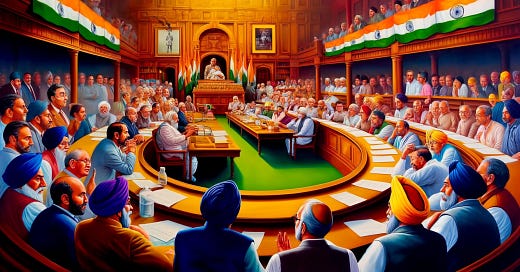Summary of the only Parliamentary Discussion on the 1984 Anti-Sikh Riots
A lot has been said but little has been done to ensure justice and after four decades it may not be incorrect to say that the more the things change, the more they are the same.
Discussion following Call-Attention Motion
Sardar Tarlochan Singh, the former Rajya Sabha MP and former Chairman of the Minorities Commission, recently shared an 81-page PDF file on an email group of eminent Sikh leaders. The document captures the only parliamentary debate on the 1984 anti-Sikh riots, which took place on 14th December 2009, in pursuance to his “Call Attention Motion”. This historic record includes speeches by the Home Minister P. Chidambaram, Leader of the Opposition Arun Jaitley, and various leaders from different political parties. The attached file, presented in English, Hindi, and Urdu, and sometimes even in Punjabi, contains the complete debate. For your convenience, the key points have been culled out for ready reference, and the matter converted into a brief article, with my own perspectives towards the end.
Naresh Gujral's Emotional Speech
Naresh Gujral, representing the Shiromani Akali Dal, delivered a powerful and emotional speech highlighting the profound impact of the 1984 anti-Sikh riots. He emphasized that 25 years had passed without justice for the victims. Gujral criticized the lack of accountability, noting that even though several commissions had identified culprits, none of the leaders responsible were punished. He recounted the horrific events, including organized mobs targeting Sikhs and the police's refusal to intervene. Sharing personal anecdotes, he illustrated the violence and anguish experienced by the victims. Gujral urged the government to allow the CBI to proceed with charges against those named in the Nanavati Report and to ensure justice for the affected.
Jaya Bachchan and Other Members
Jaya Bachchan expressed that the frustration and pent-up anger were due to the lack of justice and resolution for the victims. Other members joined the discussion, demanding action from the Home Minister to address the issue within three days.
Birendra Prasad Baishya's Remarks
Baishya described the 1984 violence as the worst communal violence in independent India, comparing it to the Jallianwala Bagh massacre. He supported the demand for immediate government action and criticized the compensation offered to victims as insufficient.
Dr Gyan Prakash Pilania's Statement
Pilania reflected on the painful memories of the 1984 riots, calling it a black chapter in India's history. He emphasized the need for justice and healing for the Sikh community and criticized the government's failure to fulfill its duties.
Shri D. Raja's Perspective
Raja asserted that the 1984 events were not just a riot but a calculated massacre targeting Sikhs. He called for strong political commitment to provide justice and warned against the government protecting the guilty. Raja stressed the importance of addressing the grievances of the Sikh community to prevent further alienation.
Shri Truchi Siva’s Appeal
Siva highlighted the need for permanent rehabilitation and accountability for the victims. He praised the contributions of the Sikh community to India's history and called for the government to ensure justice and compensation.
Arun Jaitley's Forceful Address
Critique of Government Handling
Arun Jaitley, the Leader of the Opposition, delivered a scathing critique of the government's handling of the 1984 massacre, describing it as a state-sponsored atrocity. He began by acknowledging his responsibilities and the importance of historical accuracy. Quoting from a book with a foreword by Khushwant Singh, Jaitley highlighted how those responsible for the anti-Sikh riots were not punished but rather rewarded with Cabinet positions, questioning the sincerity of the government's commitment to justice. He underscored the political and administrative collapse during the 1984 violence, emphasizing the need for immediate and effective action to address the long-standing grievances of the Sikh community.
Investigative Challenges and Institutional Failures
Jaitley detailed the investigative challenges, recounting the difficulties faced in achieving justice for the victims, including the delay in filing FIRs and the government's reluctance to act against perpetrators. He noted the suppression of a booklet that investigated the truth of the 1984 events, illustrating the collapse of institutional integrity and freedom of expression. Criticizing the state's involvement and questioning whether the violence was state-sponsored or condoned, Jaitley pointed out the failure to act on commission reports and the appointment of multiple committees without tangible results. He highlighted the legal hurdles in prosecuting individuals under Sections 153A (inciting communal hatred) and 302 (murder or conspiracy to murder), stressing the government's delay in granting prosecution permission.
Calls for Accountability and Justice
Discussing specific cases like that of Mr. Tytler, Jaitley revealed internal disagreements within the CBI and Government interference that hindered prosecution efforts. He pointed out the inadequacies in compensating the victims, noting that only a portion of the allocated funds had been disbursed even after 25 years, underscoring the government's insensitivity to the victims' plight. Jaitley called for genuine accountability and justice, emphasizing that the Government's track record in dealing with the 1984 riots had been dismal. He urged the Government to take decisive steps to ensure justice for the victims and restore faith in the country's institutions.
P. Chidambaram's Response
Legal and Departmental Challenges
P. Chidambaram, the then Minister for Home Affairs and Internal Security, addressed the various points raised by the Members. He noted that in the past 25 years, only seven police officers faced departmental action, with many exonerated or having their cases stayed by higher courts. No police officer had been convicted despite the large number of deaths, particularly highlighting the cases from Kalyanpuri and Srinivaspuri police stations. Chidambaram discussed the legal obstacles preventing the punishment of police officers, as laws tended to protect retired officers from prosecution for actions taken while in service.
Persistent Efforts and Prosecution Hurdles
Despite persistent efforts, Chidambaram found it challenging to bypass the rule book and legal constraints to punish officers guilty of dereliction of duty. He mentioned that the CBI had found evidence against some individuals and had filed charge sheets. He detailed specific cases, including those against Shri Dharam Das Shastri and Shri Jagdish Tytler, with varying outcomes in courts and pending prosecutions. Chidambaram clarified that the competent authority for prosecution is the Lieutenant Governor, not the Home Minister.
Addressing Missing Persons and Compensation Delays
Chidambaram also addressed the issue of missing persons, noting that he recently received a list of five cases and committed to compiling a comprehensive list of missing persons from 1984 to ensure compensation for their families. He emphasized the need for impartiality and speed in prosecuting guilty parties and assured that no political influence would affect the prosecution process. Chidambaram reaffirmed his commitment to healing the wounds of the Sikh community and ensuring justice for the victims of the 1984 riots. He outlined the delays in compensation disbursement, citing bureaucratic hurdles and disputes among successors, and committed to urging State Governments to expedite the process and disburse the remaining compensation funds.
Final Remarks on Political Neutrality and Responsibility
In his final remarks, Chidambaram expressed regret over the introduction of political angles towards the end of the debate. He reiterated the government's collective responsibility to protect minority interests and ensure justice.
Conclusion
Grievances and Systemic Failures
In summary, the discussion highlighted the long-standing grievances of the Sikh community regarding the 1984 anti-Sikh riots, the failure of successive governments to ensure justice, and the systemic issues within the political and legal framework that have hindered accountability. Late Arun Jaitley had very eloquently and empathetically emphasized the need for sincere commitment and immediate action from the Government to address these issues and provide justice to the affected community. P. Chidambaram had also focused on the challenges of prosecuting and punishing those responsible due to legal and bureaucratic obstacles, reiterating the Government's commitment to justice and efforts to expedite compensation and prosecution processes.
Persistent Injustice
It is, however, a sad and undisputed fact that despite the passage of almost four decades, the victims have not received justice. More has been said but little has been done. As India readies to vote in Punjab in the last phase of the Lok Sabha elections on 1st June, and virtually on the eve of the 40th anniversary of the most unfortunate Operation Blue Star of June 1984, a perusal of these debates reveals that the more things change, the more they remain the same. There needs to be a concerted effort to take things to their logical conclusion rather than slow paddling on the pretext of due process of law.
Sikh Community's Loyalty and Legitimate Grievances
However, the Sikh community, except for a very small microscopic minority, remains committed and loyal to being proud citizens of the Union of India, also known as Bharat. Despite irresponsible elements, especially anonymous Twitter handles, trying to belittle the Sikhs and label them en masse as “Khalistanis,” this proud community continues to unequivocally throw its lot with India. However, its legitimate grievances should be addressed and resolved, clearly distinguishing the issues of the Sikhs from those of the farmers of India in general and other legitimate political demands of Punjab and Punjabis in general. Such steps shall lead to a stronger Bharat as well as Punjab and even a more robust Sikh community that will forever serve as the sword-arm of Bharat.





